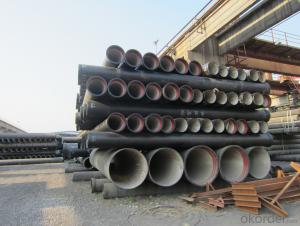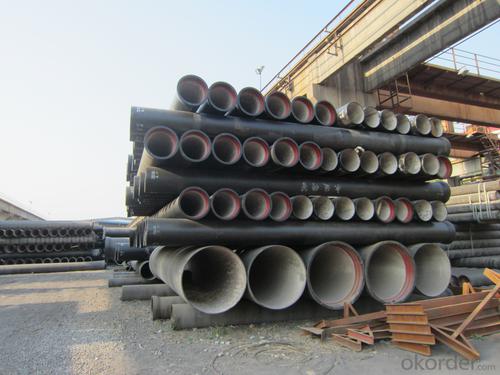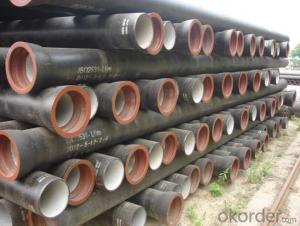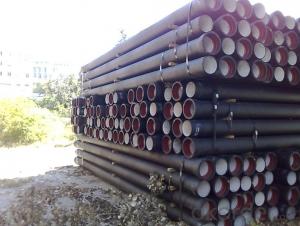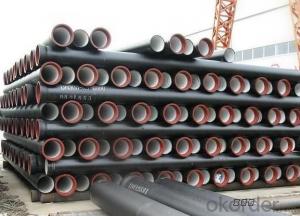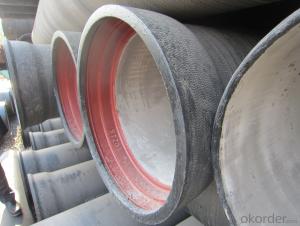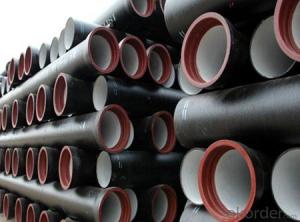Ductile Iron Pipe of China DN400 EN545/EN598/ISO2531 for Water Supply
- Loading Port:
- China main port
- Payment Terms:
- TT or LC
- Min Order Qty:
- 20 m.t.
- Supply Capability:
- 100000 m.t./month
OKorder Service Pledge
OKorder Financial Service
You Might Also Like
1,Ductile Iron Pipe Description :
1) Pipes confirm to ISO2531,K9 class,T type joint,6m long,with inside cements lining conform to ISO4179, outside Zinc spraying(130g/m2) and bitumen coating(70μm) conform to ISO8179.
2) Pipe ends: Spigot and socket ends, with 100% SBR rubber gaskets accoding to ISO4633
3) we can do third party inspection according to customer's request.
4) Our products have been sold to many international market, such as Middle East and South East Asia and Africa.
2,Main Features of the Ductile Iron Pipe:
•High yield strength
•High tensile Strength
•High corrosion resistance
•Pressure Resistence
•Anti-corrosion
•Installation is convenient
•Satisfy the highest hygienic standards
1. Material: Ductile iron grade 500-7/ 450-10 in accordance with ISO1083
2. Standard: ISO 2531, EN545, EN598, ANSI, AWWA
3. Certificate: ISO9001, ISO14001, SGS, NSF, WRAS
4. Test: In accordance with ISO 2531 / EN 545 / EN598 and 100% water pressure test
5. Length: 6m or cut into 5.6m, 5.7m, 5.8m
6. Internal Lining: Cement, conform to ISO4179
7. External coating: Zinc + Bitumen, conform to ISO8179
3,Ductile Iron Pipe Images:
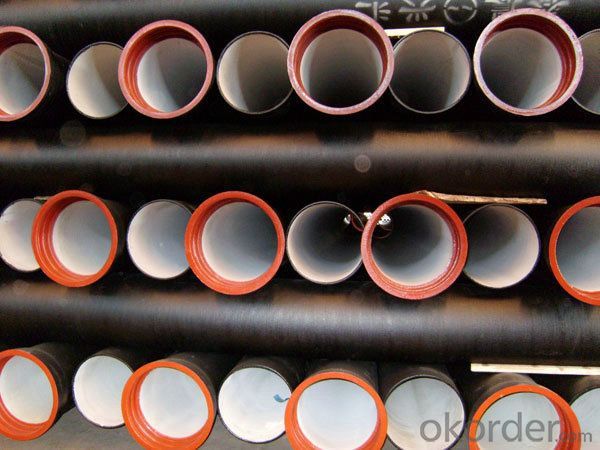
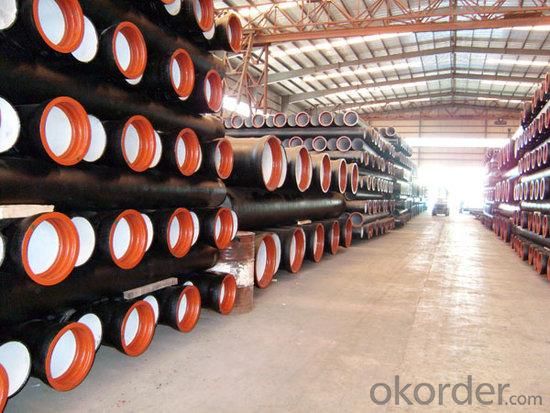
4. Ductile Iron Pipe Specification
Place of Origin: China (Mainland)
Model Number: DN80-1600
Length: 6M/5.7M/NEGOTIATED
Standard: ISO2531 / EN545
Application: Potable/Sewage Water
Diameter: DN80-1600
Shape: Round
Hardness: 230
Pipe Wall Thickness: standerd
Pull Strength: 420
Yield (≥ MPa): 300
Material: Ductile Iron
water ductile iron pipe: SO2531 / EN545 DI pipe
5.FAQ:
We have organized several common questions for our clients,may help you sincerely:
1.Q: Why would you choose ductile iron pipe rather than other pipe materials?
A:The reasons are obvious for that not only ductile iron pipe possesses the inherent strength and flexibility of ductile iron, combined with proven corrosion protection systems, but also the cost savings can be achieved from design to installation and commissioning.
2.Q:Why can you guarantee the inner of pipes can’t be corroded?
A: High alumina cement mortar lining and sulphate-resistant cement mortar lining. These two special linings are applicable to inner anti-corrosion for sewage pipes, improving resistance to erosion of the sewage components.
- Q: How does ductile iron pipe perform in areas with high soil settlement?
- Ductile iron pipe is known for its exceptional performance in areas with high soil settlement. Due to its inherent strength and durability, it can withstand the pressures exerted by settling soil without compromising its structural integrity. The flexibility of ductile iron pipe allows it to accommodate ground movements caused by soil settlement, thus minimizing the risk of pipe failure or damage. Its ability to adapt to these movements helps prevent cracks, leaks, and breaks that could occur in more rigid pipe materials. Moreover, ductile iron pipe's strong resistance to corrosion provides an added advantage in high soil settlement areas. It can withstand the corrosive effects of the soil and other environmental factors, ensuring the longevity and reliability of the pipe system. In areas with high soil settlement, ductile iron pipe is often the preferred choice due to its ability to handle ground movements without sacrificing performance. Its strength, flexibility, and resistance to corrosion make it an ideal solution for maintaining a robust and efficient water distribution system even in challenging soil conditions.
- Q: What is the expected fire resistance of ductile iron pipes?
- The expected fire resistance of ductile iron pipes can vary depending on several factors such as the thickness of the pipe walls, the quality of the installation, and the surrounding conditions. However, generally speaking, ductile iron pipes have a high fire resistance due to their durable and heat-resistant material composition. Ductile iron is made by adding a small amount of magnesium to cast iron, which enhances its strength and flexibility. This makes ductile iron pipes less susceptible to cracking or breaking under high temperatures compared to other materials like PVC or HDPE pipes. In terms of fire resistance, ductile iron pipes can withstand high temperatures for an extended period of time without significant structural damage. They have been tested and proven to maintain their integrity in fire conditions for up to 2-4 hours, depending on the specific pipe design and installation. It is important to note that while ductile iron pipes have a high fire resistance, they are not fireproof. In case of a fire, it is crucial to follow proper fire safety protocols and consult with professionals to ensure the safety of the system and surrounding infrastructure.
- Q: Can ductile iron pipes be used in areas with high temperature variations?
- Yes, ductile iron pipes can be used in areas with high temperature variations. Ductile iron has a high resistance to thermal expansion and contraction, making it suitable for withstanding temperature fluctuations without compromising its structural integrity or performance.
- Q: What is the typical wall thickness of ductile iron pipes?
- The typical wall thickness of ductile iron pipes can vary depending on the specific application and diameter of the pipe. However, in general, ductile iron pipes commonly have a wall thickness ranging from around 0.25 inches to 0.5 inches.
- Q: Why does the cast iron pipe always run off when testing?
- The pipeline is installed, straight section of each pipe will be added pier, concrete pipe, elbow, three links should also have concrete pier, specific installation method according to GB Atlas 03SS515, and the straight pipe to soil, pipeline interface will be exposed, easy to check.
- Q: What is the average weight of ductile iron pipe?
- The size and thickness of ductile iron pipe can cause fluctuations in its average weight. Typically, smaller diameters of ductile iron pipe weigh around 3.5 pounds per foot, while larger diameters can exceed 20 pounds per foot. It is essential to acknowledge that these weights are rough estimates and might slightly differ depending on the manufacturer and pipe specifications.
- Q: Can ductile iron pipes be used for underground chemical transport systems?
- No, ductile iron pipes are not suitable for underground chemical transport systems as they are prone to corrosion and may react with certain chemicals, leading to potential leaks and contamination.
- Q: Can ductile iron pipes be used for gravity flow applications?
- Ductile iron pipes are suitable and widely used for gravity flow applications. Renowned for their strength, durability, and flexibility, these pipes are perfect for a variety of uses, such as gravity flow systems. They are commonly employed in water and wastewater systems, storm drainage systems, and other applications that necessitate resistance to high internal and external pressures. The pipes possess the capability to bear the weight of the flowing fluid without any supplemental support, which makes them a dependable choice for gravity flow applications. Furthermore, their ability to resist corrosion ensures long-term performance in both underground and exposed environments. In conclusion, ductile iron pipes are an excellent option for gravity flow applications.
- Q: What are the different accessories available for ductile iron pipe?
- There are several accessories available for ductile iron pipe, including but not limited to, flange adaptors, couplings, valves, fittings, joint restraints, gaskets, and tapping sleeves. These accessories help in connecting, repairing, and maintaining ductile iron pipe systems.
- Q: Can ductile iron pipe be used for municipal water supply?
- Yes, ductile iron pipe can be used for municipal water supply. Ductile iron pipe has excellent strength and durability, making it suitable for carrying the high-pressure water supply required for municipal systems. Additionally, its corrosion resistance and long lifespan make it a reliable choice for transporting water in urban areas.
Send your message to us
Ductile Iron Pipe of China DN400 EN545/EN598/ISO2531 for Water Supply
- Loading Port:
- China main port
- Payment Terms:
- TT or LC
- Min Order Qty:
- 20 m.t.
- Supply Capability:
- 100000 m.t./month
OKorder Service Pledge
OKorder Financial Service
Similar products
Hot products
Hot Searches
Related keywords
